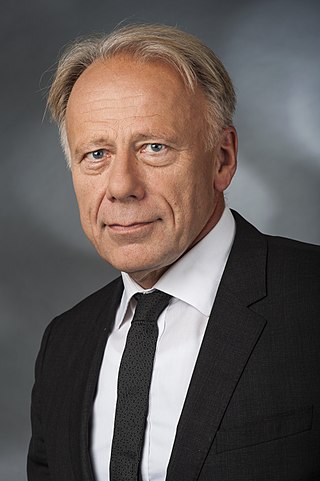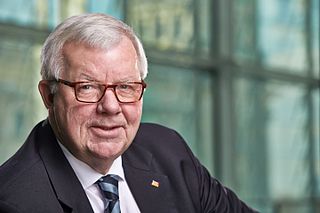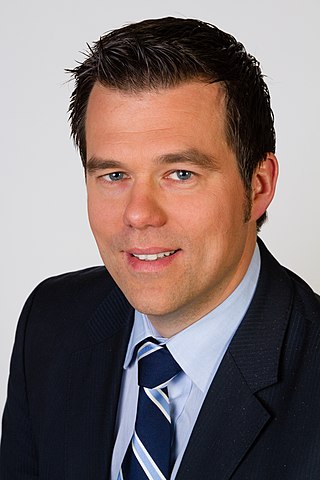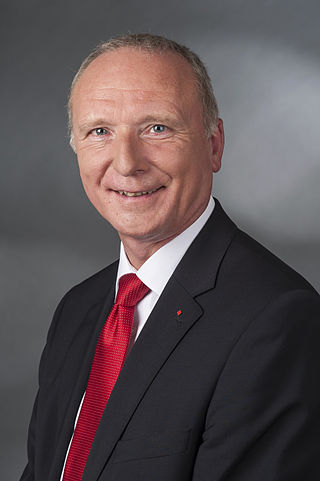
Alliance 90/The Greens, often simply referred to as Greens, is a green political party in Germany. It was formed in 1993 by the merger of the Greens and Alliance 90. The Greens had itself merged with the East German Green Party after German reunification in 1990.

Jürgen Trittin is a German Green politician who served as Minister for the Environment, Nature Conservation and Nuclear Safety in the government of Chancellor Gerhard Schröder from 1998 to 2005.

Joseph Leinen is a German politician who served as Member of the European Parliament (MEP) from 1999 until 2019. He is a member of the Social Democratic Party, part of the Party of European Socialists.

Matthias Platzeck is a German politician. He was Minister President of Brandenburg from 2002 to 2013 and party chairman of the SPD from November 2005 to April 2006.

Georg Milbradt is a German politician of the Christian Democratic Union (CDU) who served as Minister-President of Saxony from 2002 to 2008.

Michael Braungart is a German chemist who advocates that humans can make a positive instead of a negative environmental impact by redesigning industrial production and therefore that dissipation is not waste. A former Greenpeace activist who once lived in a tree as protest, he is now considered to be a visionary environmental thinker.

Stephan Weil is a German politician and the leader of the Social Democratic Party in Lower Saxony. On 20 January 2013, the SPD and the Green party won the 2013 Lower Saxony state election by one seat. On 19 February 2013, he was elected Minister President of Lower Saxony with the votes of SPD and Alliance '90/The Greens. From 1 November 2013 until 31 October 2014 he was President of the Bundesrat and ex officio deputy to the President of Germany. In November 2017, he was again elected Minister President with the votes of SPD and CDU.

Hubert Dietmar Woidke is a German politician of the Social Democratic Party of Germany. Since August 2013, Woidke has served as Minister President of Brandenburg.

Barbara Anne Hendricks is a German politician of the Social Democratic Party (SPD) who served as Federal Minister for the Environment, Nature Conservation and Nuclear Safety in the government of Chancellor Angela Merkel from 2013 until 2018.

Michael Fuchs was a German politician who served in the Bundestag from 2002 to 2017. He was elected European deputy chairman of the Trilateral Commission in 2010.

Nina Scheer is a German lawyer and politician of the Social Democratic Party (SPD) who has been a member of the Bundestag since 2013. Her political interests include energy policy and climate change. In 2019, Scheer was an unsuccessful candidate in the 2019 Social Democratic Party of Germany leadership election, in a team with Karl Lauterbach. Her father was Hermann Scheer, also a SPD Bundestag member.

Ute Vogt is a German lawyer and politician of the Social Democratic Party (SPD) who served as a member of the Bundestag from 1994 to 2005 and from 2009 to 2021. Since 2021, she has been serving as president of the German Life Saving Association (DLRG).

Gero Clemens Hocker is a German economist and politician of the Free Democratic Party (FDP) who has been serving as a member of the Bundestag from the state of Lower Saxony since 2017.

Steffi Lemke is a German politician of Alliance 90/The Greens who has been serving as Federal Minister for the Environment, Nature Conservation, Nuclear Safety, and Consumer Protection in Chancellor Olaf Scholz's cabinet since 2021.

Cansel Kiziltepe is a German economist and politician of the Social Democratic Party (SPD) who has been serving as State Minister (Senator) for Labour, Social Affairs, Equality, Integration, Diversity and Anti-Discrimination in the government of Governing Mayor Kai Wegner since 2023.

Carsten Träger is a German politician of the Social Democratic Party (SPD) who has served as a member of the Bundestag from the state of Bavaria since 2013.

Bernd Westphal is a German trade unionist and politician of the Social Democratic Party (SPD) who has been serving as a member of the Bundestag from the state of Lower Saxony since 2013.

Georg Nüßlein is a German politician who served as a member of the Bundestag from the state of Bavaria from 2002 until 2021. From 1987 until 2021, he was a member of the Christian Social Union (CSU). He left the party in the wake of his loss of immunity and allegations of corruption related to the procurement of FFP2 masks ("Maskenaffäre").

Carola Reimann is a German politician of the Social Democratic Party (SPD) who served as State Minister for Social Affairs, Health, and Equality in the cabinet of Minister-President Stephan Weil of Lower Saxony from 2017 to 2021. She previously represented Braunschweig in the Bundestag from 2002 until 2017.

Susanne Kathrin Michel is a German trade unionist and politician of the Social Democratic Party (SPD) who has been a Member of the German Bundestag for Saxony since 2021.





















